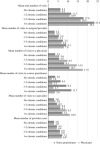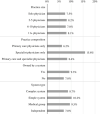Role of Nurse Practitioners in Caring for Patients With Complex Health Needs
- PMID: 32925414
- PMCID: PMC7552908
- DOI: 10.1097/MLR.0000000000001364
Role of Nurse Practitioners in Caring for Patients With Complex Health Needs
Abstract
Objective: The objective of this study was to estimate trends in the percentage of Medicare beneficiaries cared for by nurse practitioners from 2012 to 2017, to characterize beneficiaries cared for by nurse practitioners in 2017, and to examine how the percentage of beneficiaries cared for by nurse practitioners varies by practice characteristics.
Design: An observational study of 2012-2017 Medicare fee-for-service beneficiaries' ambulatory visits. We computed the percentage of beneficiaries with 1 or more ambulatory visits from nurse practitioners and the percentage of beneficiaries receiving the plurality of their ambulatory visits from a nurse practitioner versus a physician (ie, predominant provider). We compared beneficiary demographics, clinical characteristics, and utilization by the predominant provider. We then characterized the predominant provider by practice characteristics.
Key results: In 2017, 28.9% of beneficiaries received any care from a nurse practitioner and 8.0% utilized nurse practitioners as their predominant provider-an increase from 4.4% in 2012. Among beneficiaries cared for by nurse practitioners in 2017, 25.9% had 3 or more chronic conditions compared with 20.8% of those cared for by physicians. Beneficiaries cared for in practices owned by health systems were more likely to have a nurse practitioner as their predominant provider compared with those attending practices that were independently owned (9.3% vs. 7.0%).
Conclusions: Nurse practitioners are caring for Medicare beneficiaries with complex needs at rates that match or exceed their physician colleagues. The growing role of nurse practitioners, especially in health care systems, warrants attention as organizations embark on payment and delivery reform.
Conflict of interest statement
The authors declare no conflict of interest.
Figures




Comment in
-
The Murky Waters of Nurse Practitioners and Medicare Claims.Med Care. 2020 Oct;58(10):851-852. doi: 10.1097/MLR.0000000000001406. Med Care. 2020. PMID: 32925413 No abstract available.
References
-
- The Institute of Medicine (IOM), Yong PL, Saunders RS, Olsen L, The Healthcare Imperative: Lowering Costs and Improving Outcomes: Workshop Series Summary. Washington, DC: The National Academies Press; 2010. - PubMed
-
- Rich E, Lipson D, Libersky J, et al. Coordinating Care for Adults With Complex Care Needs in the Patient-Centered Medical Home: Challenges and Solutions. Rockville, MD: AHRQ Publication No. 12-0010-EF; 2012.
-
- Bodenheimer T, Chen E, Bennett HD. Confronting the growing burden of chronic disease: can the U.S. health care workforce do the job? Health Aff (Millwood). 2009;28:64–74. - PubMed
Publication types
MeSH terms
Grants and funding
LinkOut - more resources
Full Text Sources
Medical

